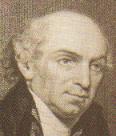Heroes of the Faith
Concise stories of significant Christian leaders
Concise stories of significant Christian leaders
© Peter J. Blackburn 1999
Heroes of the Faith
Heroes of the Faith

 William Carey
William Carey1761-
———————————————————————
William Carey was the son of an English weaver. He had limited formal schooling and was apprenticed to a shoemaker. His interests were broader than perfecting a skilled craft. He began studying the New Testament and Greek during his apprenticeship. In 1785 he began full-time ministry at the Baptist church in Moulton.
Carey had personal interests in travel and geography - was intrigued with accounts of exploration and read with fascination the volumes of Captain Cook's Voyages. He became deeply concerned about the many peoples who had not heard of Christ. In a Baptist ministerial meeting at Northampton in 1786, he raised the issue of the Great Commission and its application for modern times. The reaction was immediate and harsh. The very suggestion that these ministers were in some way responsible to "teach all nations" was ridiculed as the fantasy of an enthusiast. They believed that God would use supernatural means to evangelise the unreached tribes and nations. So Carey was publicly rebuked.
In the months that followed he worked on an eighty-seven-page treatise with the (shortened!) title An Enquiry into the Obligations of Christians to Use Means for the Conversion of the Heathens. This was published in 1792. Opening with a concise Scriptural defense of missions, he proceeded to cite mission work throughout church history from the earliest apostles to the Moravians and John Wesley. He then went on to present statistical tables surveying the countries of the world - their populations, land size, and religions - and to answer the arguments against the practicality of foreign missions. In the final chapter, he outlined a strategy for missions and dealt with such issues as prayer support, denominational cooperation, finances, and the quality of recruits.
The Enquiry, though significant in missionary literature, was not widely read or circulated when first printed. What gave the work credibility was Carey's personal demonstration of his concern for missions, his example as a volunteer for the inaugural operation of the Baptist Missionary Society, formed some months after the publication of the Enquiry. In a sermon from Isaiah, Carey had challenged his fellow pastors of the local Baptist Association to broaden their horizons of ministry, to "expect great things from God; attempt great things for God." It was a moving sermon, but most of the pastors lacked vision. It was the commitment of Andrew Fuller to the cause that led to the official organisation of the new mission society.
Carey, with a physician, John Thomas, became the first missionary under the society, setting sail with his wife and young family for India in 1793. The early years in India, living in a malaria-infested marsh outside Calcutta, were very trying. Housing was inadequate, as was the food supply and health care. After seven years of struggling to establish a ministry, Carey was unable to claim even one Indian convert. He had, however, acquired a remarkable grasp of the language, had translated large portions of the New Testament into Bengali, had planted a tiny non-Indian church and had made the name of Christ known throughout much of Northern Bengal.
In 1800 he moved his base to Serampore, a Danish colony out of reach of the troublesome East India Company. By 1803 there were twenty-five converts. Still, the work was slow. After a quarter of a century the number of baptised converts did not exceed seven hundred.
The centrality of the Scripture to world evangelism was powerfully demonstrated throughout Carey's long missionary career. With the help of Indian teachers he made six translations of the entire Bible and translated the New Testament and portions of Scripture into nearly thirty additional languages. Another priority was the necessity of establishing an indigenous church. Carey has been called the "father of modern missions," not just because of his own personal involvement, but because of the role he played in turning the tide of Protestant thought in favour of foreign missions.